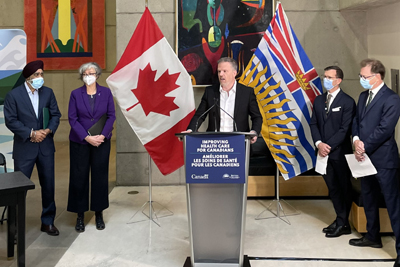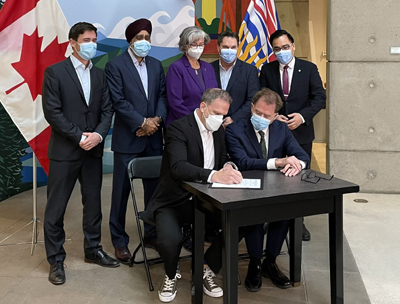
Tuesday October 10, 2023 | VANCOUVER, BC
by Mary P Brooke | Island Social Trends
Health Canada is releasing $1.2 billion to the Province of British Columbia for health care funding over three years. The bilateral agreement is part of a 10-year plan.
The announcement was made in Vancouver today at Vancouver General Hospital, led by Health Minister Mark Holland with BC Health Minister Adrian Dix and BC Mental Health and Addictions Minister Jennifer Whiteside in attendance.

Health Minister Mark Holland called it “a commitment to health transformation” in Canada, from being “one of the best, to the best” health care systems.
First of more to come:
Today’s agreement between the federal government and BC is the first of 13 signed agreements between the federal government and provincial and territorial governments.
Holland announced a total of $200 billion over the next 10 years for the country, with tailored plans for each province and territory.
Priorities:
Holland said the funding is about expanding access to family healthcare teams in rural, remote and urban communities. He added too many people don’t have a family physicians.
This three-year plan includes developing a model of care at 83 acute care sites throughout BC, more access to mental health and addiction services, including expanding the number of Foundry centres from 16 to 35 across the province and reducing 30-day re-admissions for mental illness and substance use.
Holland articulated about the challenges of helping people deal with mental health and addictions, saying that people who end up addicted or overdosing are at “the end of a road” and that there was “a lot of darkness that got you to that decision”. Of the $1.2 billion, $246 million will go toward mental health and addictions.
The province has also agreed to work with the First Nations Health Authority to improve access to culturally appropriate and trauma-informed treatment and care.

More people will have access to their own electronic health information.
The October 10, 2023 Health Canada news release provides these details:
- Developing an innovative model of care at 83 acute care sites throughout British Columbia so nurses can spend more time with patients. As well, by introducing additional recruitment and retention initiatives, patients across the province will have improved access to team-based family health care, including to family doctors, nurses and nurse practitioners, ultimately helping to reduce diagnostic and treatment backlogs;
- Enhancing access to mental health and addictions services by building on existing efforts in areas of integrated youth services, treatment and recovery, and innovative approaches to respond to the ongoing overdose crisis. British Columbia plans to expand the number of Foundry centers from 16 to 35 across the province, and reduce 30-day re-admissions for mental illness or substance use;
- Supporting efforts led by the First Nations Health Authority to increase the number of individuals and communities with access to culturally safer, trauma-informed, and culturally appropriate healing and treatment services, and mental health and substance use care;
- Improving outcomes by continuing to address backlogs caused by the COVID-19 pandemic and expand initiatives like Hospital at Home to help tackle wait times for inpatient services and decrease pressure on these services;
- Increasing the percentage of people in the province who have access to their own electronic health information to 75% to help people take control of their health; and
- Increasing the percentage of family health service providers that can securely share patient health information to 50%.
Hiring health care workers:
Dix said that BC needs to hire “tens of thousands of new health care workers”, repeating his oft-said statement now, that 38,000 health care workers were hired over the past five years, and that the same number of workers need to be hired over the next five years, and again for another five years.
Dix pointed out, in particular, that more health care workers are needed for the four new cancer treatment centers that are being opened around the province.



